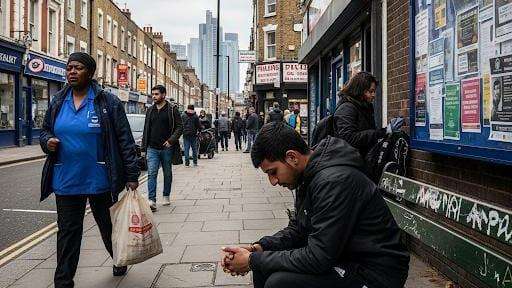New figures from the Office for National Statistics (ONS) have revealed that one in seven households in Tower Hamlets—the borough with the largest Bangladeshi population in the UK—were "workless" last year. While the proportion has seen a slight decrease from the previous year, it underscores significant and persistent regional inequalities across Great Britain.
In 2024, there were 17,972 workless households in Tower Hamlets, which accounted for 14% of all households in the area. This is a reduction from 19,971 households, or 16%, the year before. A "workless household" is defined as a household containing at least one person aged 16 to 64 where no adults are in employment, excluding households where all adults under 24 are in full-time education.
The figures from Tower Hamlets, a borough known for its large and vibrant Bangladeshi community, are part of a wider national trend. Across Great Britain, over three million households were workless in 2024, representing just over 14% of all households. However, this proportion varies drastically by region, from just under 11% in the South East to a high of 21% in the North East. Nationally, the share of households out of work increased in 59% of local authorities, while it decreased in the rest, including Tower Hamlets.
A spokesperson for the employment charity Shaw Trust highlighted that regional health and opportunity inequalities are key factors that "can compound worklessness in communities." They explained that a high proportion of workless households can have a broader negative impact on a community's health and wellbeing, leading to isolation, a poor quality of life, and mental health issues. The charity stressed the need for a collaborative approach involving health services, employment support, councils, and local employers to "break the cycle of worklessness."
The ONS data also identifies sickness and disability as the primary reason for households being out of work, both nationally and in London, where it accounts for 38% of cases. Other reasons included early retirement, looking after family or home, and studying.
In response, Tom Marsland, head of policy at disability charity Sense, stated that it is "unsurprising that sickness and disability is the main reason for households to be out of work." He pointed to significant barriers faced by disabled people who want to work, such as "unfair recruitment practices, a lack of support from employers and a complete absence of specialist assistive technology in job centres." He called for "urgent action" to address these issues.
In response to the data, a Department for Work and Pensions spokesperson said the government is "reforming the broken welfare system we inherited" by investing £3.8 billion for "tailored employment support" and overhauling Jobcentres to better help people into "good, secure jobs." The spokesperson added that the government is rolling out a program to connect offers of work, health, and skills support to areas with the highest levels of economic inactivity.
While the data provides a clear snapshot, it does not fully detail the specific challenges faced by different demographics within Tower Hamlets, such as the Bangladeshi community, which constitutes a significant portion of the borough's population. It also does not include updated comments from local government officials in Tower Hamlets on how they are specifically addressing these issues. The figures from the ONS, however, provide a stark reminder that while the borough has seen a marginal improvement, the challenge of worklessness remains a persistent issue, mirroring a wider national problem tied to health and economic disparities.
_6.jpg)
_5.jpg)
_6.jpg)
_7.jpg)




.svg)


